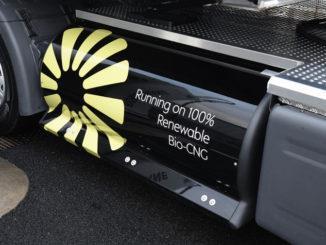
CNG Fuels has announced plans to become the UK’s first supplier of renewable biomethane from cow manure for lorries, to help operators achieve net zero emissions.
The company said it was also consulting on how its network of refuelling stations can accommodate low carbon and battery electric technologies for HGVs, for when these become commercially viable.
John Lewis has already committed to replacing its fleet of 500-strong diesel trucks with biomethane fuelled alternatives by 2028 and Hermes also intends to replace its 200 diesel HGVs as well.
Philip Field, CEO of CNG Fuels said: “Renewable biomethane sourced from manure is currently the best low-carbon solution for HGVs, but we want to be ready to support our customers when other technologies are commercially viable for freight transport.”
Andy Eastlake, MD at the Low Carbon Vehicle Partnership added: “With all the focus on electrification, the low carbon combustion fuels might be overlooked. But it is vital to remember that Net Zero can be delivered in a number of ways.”
A CNG spokesman told Motor Transport it was “highly likely” that the manure would be sourced within the UK.
Read more
- CNG Fuels to pump out another five biomethane gas stations this year
- Waitrose and CNG Fuels underway with major dedicated gas truck trial
- CNG Fuels to supply Waitrose, Argos and Brit European, with biomethane fuel
Biomethane is different to the fossil fuel methane in that it comes from natural biological sources that weren’t living millions of years ago.
It is considered carbon neutral because the carbon dioxide released from it in the exhaust pipe was only removed very recently from the atmosphere, usually when the plant was growing.
However, manure as a fuel is considered carbon negative, because the CO2 released from it in a combustion engine is much less than letting it rot in fields or slurry pits.
CNG Fuels’ announcement came as a two-year UK research project to assess the viability of biomethane in HGVs found 1,400 tonnes of greenhouse gases were saved compared to diesel.
The Dedicated to Gas project deployed 20 Euro VI trucks running on biomethane to three operators, in a combination of compressed natural gas and liquefied natural gas.
The results showed that, when compared to diesel, vehicles would make at least 17% greenhouse gas emission savings with a 25% biomethane blend, and 100% biomethane yields savings of at least 76%.
The trial drivers also reported that the gas vehicles performed better than diesel in engine noise, vibration, overall drive comfort, braking and environmental performance.
Steve Caroll, head of transport at Cenex, which helped deliver the project, said: “This project proved the economic, environmental and operational case for gas trucks powered by biomethane.”














